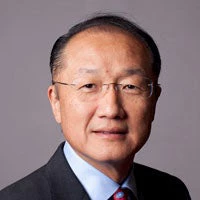Just as a patient with a weak immune system is more susceptible to disease, the Ebola crisis reminds us that a nation with a weak health system is more susceptible to epidemics. This lesson is on our minds not only because of the crippling impact of the worst Ebola outbreak in history, but also because today is the inaugural Universal Health Coverage Day.
Today also marks the second anniversary of the United Nations' declaration in support of Universal Health Coverage (UHC), so that no one should fall into poverty to pay for the health care they need. A global coalition of more than 500 organizations, including the World Bank Group and the Rockefeller Foundation, are engaging citizens around the world in support of this goal as both a human right and a smart investment.
This mobilization toward UHC defies a one-size-fits-all approach, recognizing that diverse contexts will drive country-specific paths. Whatever the path taken, it's indisputable that progress towards UHC will bolster weak health systems.
Ebola spread so quickly in part because of weak health systems in Guinea, Liberia, and Sierra Leone. But weak systems are also dangerous breeding grounds for more common conditions like cancer, heart disease, and hypertension.
Too many countries rely on broken systems for financing and delivering care. Their citizens have to dig deep into their pockets to pay for essential medicines or other health services. As a result, an estimated 100 million people fall into poverty each year to pay for health care, and an estimated 1 billion people lack access to health care altogether. When huge swaths of people are denied access to quality care, it puts everyone in peril.
Resilient health systems, though, can reduce the risk caused by inequity in coverage. Both Nigeria and Senegal were able to control imported cases of Ebola, thanks to investments in health systems.
Universal health coverage is a smart investment. Advanced economies in Europe, Canada and Japan have guaranteed health coverage to their populations for decades, decreasing their citizens' out-of-pocket expenses. Emerging economies like Brazil, Russia, India, China and South Africa — representing nearly half the world's population — are now taking steps in the same direction. There have been some tremendous successes: Rwanda invested in a universal health coverage system after the 1994 genocide. Today close to 80 percent of Rwandans are insured and life expectancy has more than doubled.
The diversity of dividends is what truly makes the investment pay. Healthier societies are more productive societies, with stronger economies and more cohesive communities. The recent Lancet Commission on Investing in Health discovered that investments in health were responsible for nearly one quarter of all economic growth in developing countries between 2000 and 2011.
That's why Nigeria, Liberia and Sierra Leone have all been planning health reforms that will move them closer to universal coverage. It's also why a substantial portion of the nearly $1 billion the World Bank Group has committed to the Ebola response is dedicated to helping build resilient health systems in West Africa.
Even in the face of Ebola, there is reason to hope. The first part of the 21st century has already seen substantial improvements in health. More than 10 million people in the developing world are now receiving treatment for AIDS (up from 50,000 a decade ago), we are making real progress toward controlling malaria, and more children than ever are celebrating their fifth birthday. With all the tools at our disposal and evidence at hand, we can't let poor health systems hold us back.
To respond to the Ebola epidemic, affected countries and those helping them have had to scramble to put systems in place. If there had been stronger health systems with communications and surveillance capacity, to provide low-cost, quality basic health services and prevent illness, the human and economic costs of this crisis likely would not have been so dire. We now must shift our focus from reaction and responding to planning and preparing. Only then will our health investments lead to real gains in the health of all people regardless of their income or nationality.
This blog post was originally published in the Huffington Post.



Join the Conversation